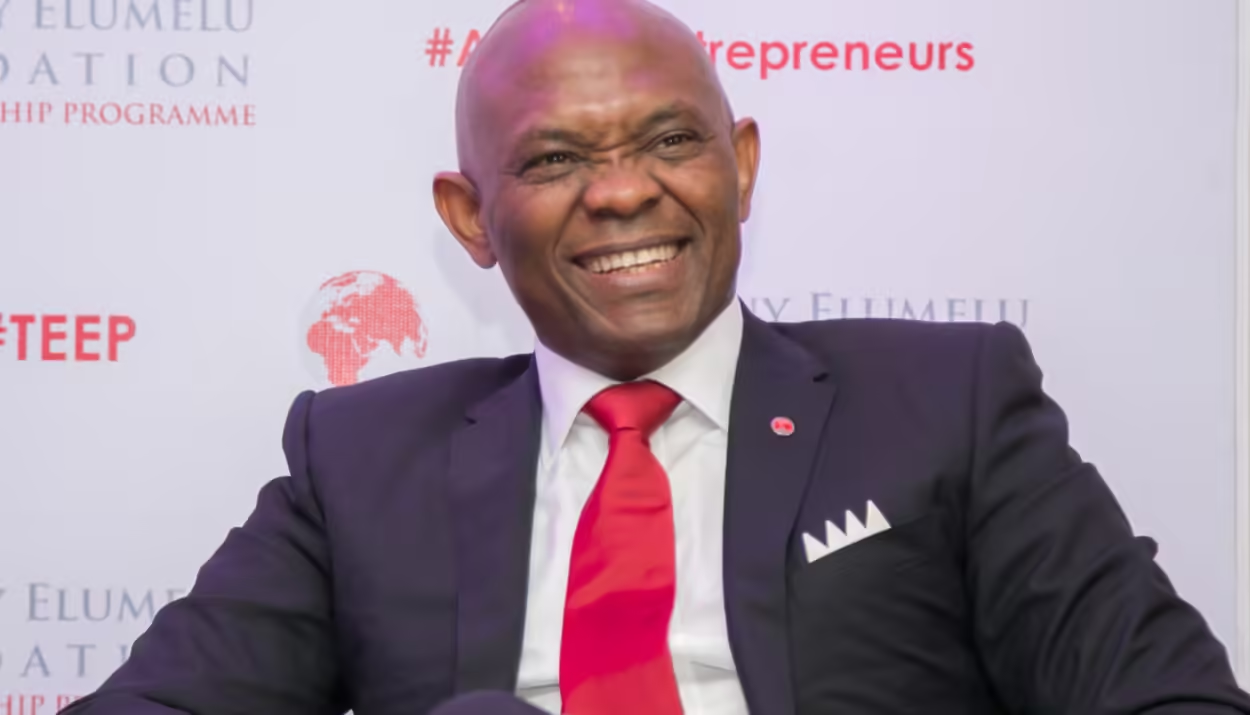Tony Elumelu evokes both admiration and scrutiny in some quarters. As one of Africa’s most prominent businessmen, the Nigerian-born investor and philanthropist has built a multibillion-dollar empire that spans banking, energy, real estate, and hospitality. Particularly, he has positioned himself as an advocate for African business. Through his investments and charities, like the Tony Elumelu Foundation, Elumelu has been one of the most visible ambassadors of a rising Africa—one driven by homegrown entrepreneurs and not foreign aid.
Yet, Elumelu’s rise to prominence hasn’t been without its share of criticism. Some view his approach to business as overly aggressive, citing concerns over transparency in the major banking mergers that propelled him. His critics also point to sectors like energy, where his ventures have sometimes fallen short of delivering the public services promised, particularly in Nigeria’s power sector, where blackouts and inefficiencies persist despite his company’s heavy presence.
Still, it’s hard to deny Elumelu’s importance in shaping the current discourse around Africa’s economic future. His championing of “Africapitalism”—a term he coined to describe the melding of profit and social good—has resonated with many who believe Africa’s salvation lies in entrepreneurship. Others, however, remain skeptical, suggesting that his vision leans too heavily on private enterprise and doesn’t adequately account for the role of structural government reforms.
Balancing these two perceptions—praise for his business acumen and skepticism of his sometimes-idealistic visions—Tony Elumelu remains one of the continent’s most impactful, and complex, figures.
Contents
Rise to prominence
Elumelu, born on March 22, 1963, in Jos, Plateau State, Nigeria, came from a modest, middle-class background. His upbringing in a tight-knit family laid the foundation for his work ethic and ambition. He pursued a degree in economics at Ambrose Alli University before earning a Master of Science degree from the University of Lagos, two institutions that would serve as stepping stones into the financial world.
Elumelu’s career began humbly as a salesman at Union Bank, Nigeria, but his ambitions quickly outgrew his role. His defining moment came in 1997 when he spearheaded a group of investors in acquiring Standard Trust Bank, a struggling institution on the brink of collapse. It was a bold and risky move for the then-34-year-old, but one that would set the tone for his career—bold, strategic, and with an eye on transformation.
Under Elumelu’s guidance, Standard Trust Bank not only recovered but thrived, rapidly becoming one of Nigeria’s top five banks. This success was just the beginning. In 2005, he orchestrated a groundbreaking merger with United Bank for Africa (UBA), transforming it into a pan-African banking behemoth. The deal positioned UBA as one of the continent’s most powerful financial institutions, with operations across more than 20 African countries and a presence in global financial hubs like London, Paris, and New York.
Through this merger, Elumelu not only secured UBA’s status as a symbol of African financial strength but also marked his own ascension as a key player in shaping the future of Africa’s banking sector. The move was lauded for its strategic brilliance, blending the agility of Standard Trust with UBA’s expansive network. Yet, some critics questioned whether the rapid consolidation within Nigeria’s banking industry risked creating too much concentration of power in too few hands, a critique that Elumelu brushed aside as the price of progress.
Vision
At the core of Tony Elumelu’s career is his strong belief in “Africapitalism,” a philosophy that champions the role of the private sector in driving economic growth and development in Africa. Elumelu has often stated that Africa’s destiny is in the hands of its entrepreneurs, and he envisions a continent where business, wealth creation, and social development go hand in hand.
Elumelu advocates that African governments must create an enabling environment for entrepreneurs to thrive. This, he argues, is the path to solving Africa’s long-standing socio-economic challenges such as poverty, unemployment, and underdevelopment. His life’s work, from the UBA merger to his more recent ventures, has revolved around this idea of empowering local businesses to compete on the global stage.
Net worth
With a net worth estimated at over $700 million by Forbes, Tony Elumelu is one of Africa’s wealthiest men. Much of his wealth is tied to his holdings in the financial sector, especially his stake in UBA and other investments under the Heirs Holdings banner, his privately owned investment company.
Through Heirs Holdings, Elumelu has made significant investments across sectors that are critical to African economies. His portfolio includes stakes in financial services, energy, real estate, and healthcare. One of his most prominent ventures is Transcorp, a Nigerian conglomerate that operates in hospitality, power generation, and oil production. Transcorp Hilton Abuja is one of Nigeria’s most luxurious hotels, and Transcorp Power is one of the country’s key power suppliers.
Tony Elumelu Foundation
Elumelu’s influence stretches beyond business into philanthropy, where he has become a champion of entrepreneurship in Africa. In 2010, he founded the Tony Elumelu Foundation (TEF), with the primary goal of promoting entrepreneurship across the continent. His foundation’s flagship program, the Tony Elumelu Entrepreneurship Programme, is arguably one of the largest private-sector-led initiatives in Africa. The program commits $100 million over ten years to support African entrepreneurs, with a vision to empower 10,000 startups by 2025.
Each year, TEF selects thousands of entrepreneurs from across Africa, providing them with seed funding, business training, and mentoring to turn their ideas into thriving businesses. This initiative reflects Elumelu’s conviction that Africa’s future depends on a new generation of entrepreneurs who can build businesses that create jobs and drive economic transformation.
Family and lifestyle

Tony Elumelu’s personal life reflects his wealth and status. He is married to Dr. Awele Vivien Elumelu, a medical doctor, and together they have seven children. Despite his demanding career, Elumelu is known to be a family-oriented man, often sharing images of his family on social media.
Elumelu leads a somewhat flamboyant lifestyle. Known for his love of luxury, he often travels on private jets, stays in five-star hotels, and is seen at high-profile global events. His sartorial choices—immaculate suits and signature red ties—add to his image as a suave and sophisticated entrepreneur. However, unlike some of his contemporaries, Elumelu tends to keep his private life relatively low-key, letting his business achievements and philanthropic efforts take center stage.
Controversies
Despite his success and public image, Tony Elumelu has not been immune to controversy. The most notable controversy in his career involved accusations surrounding the UBA merger. Some critics alleged that the merger with Standard Trust Bank involved insider dealings and lacked transparency. However, no formal charges were ever brought against him, and the business community largely saw the deal as a masterstroke of business acumen.
Elumelu has also faced criticism for the profitability of his companies, especially in sectors where there are significant public service responsibilities, such as power generation. Transcorp Power, one of Nigeria’s largest power companies, has been criticized for not delivering adequate power supply despite enjoying several government incentives. However, Elumelu has defended his investments, pointing out the regulatory and infrastructural challenges that private companies face in Africa’s power sector.
Legacy
Tony Elumelu’s story is far from over, but the mark he’s already made on African business and entrepreneurship is undeniable. Through his diverse ventures, he has been instrumental in shifting the global narrative about Africa—presenting the continent not as a land burdened by challenges, but one teeming with opportunity and innovation. His influence goes beyond business: through the Tony Elumelu Foundation, his philanthropic work has impacted thousands of lives, while his passionate advocacy for entrepreneurship is shaping economic policies and encouraging a new generation of African entrepreneurs to take charge of their futures.
Elumelu’s investments in key sectors like energy, healthcare, and financial services underscore his vision for a thriving, self-sufficient Africa, driven by homegrown talent and solutions. As global attention increasingly turns toward Africa as the next frontier of economic growth, Elumelu remains at the forefront, exemplifying what can be achieved when business meets a commitment to social responsibility. His journey from humble beginnings in Jos, Nigeria, to becoming one of Africa’s most influential billionaires is a testament to his commitment to Africa’s potential.






